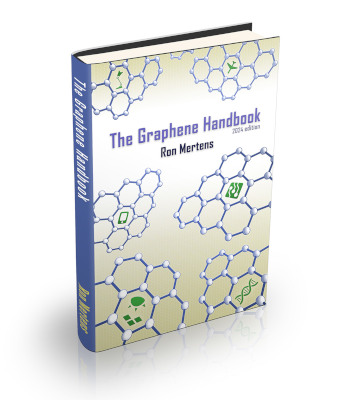The Graphene-Info weekly newsletter
Published: Tue, 01/11/22
The Graphene-Info newsletter (January 11, 2022)
Cannot read this? View it online here
Graphene and hBN nano-additives improve eco-friendly lubricant oils
Researchers from the University of Nevada have investigated the introduction of graphene nanoplatelets (GNPs) and hexagonal boron nitride (hBN) to canola oil to improve its tribological properties, as part of an effort to reduce the usage of lubricants based on petroleum as lubricants for reducing abrasion and friction.
Three nanoscale lubricating combinations were created by combining both GNP and hBN settings in varied ratios to get the best beneficial synergy. The team reports that lubrication quality and performance may be increased by using low-weight percentages of nanoparticle (NP) and microparticle additions. One benefit is that it has a reduced coefficient of friction (COF) and wearing.
realme uses graphene-based cooling tech in its new GT 2 mobile phone series announced in China
realme has announced its new GT 2 series, marking the company’s first steps into the premium segment. The GT 2 series, equipped with various top-notch gear and AMOLED panels, is also said to be sporting a graphene-based cooling system.
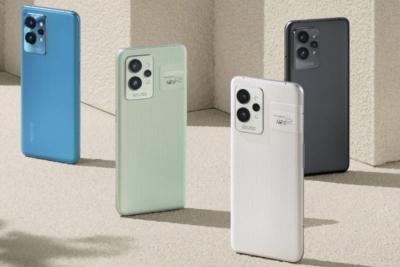
As is the case with various other mobile phones and gadgets by the likes of Huawei and ZTE, the new GT 2 series will use a 3D liquid-cooled VC and graphene sheet cooling technology.
Graphene could replace ITO in OLED displays
In a new UK-funded research, scientists from Paragraf and Queen Mary University of London have successfully fabricated an Organic Light-Emitting Diode (OLED) with a monolayer graphene anode instead of the problematic ITO.
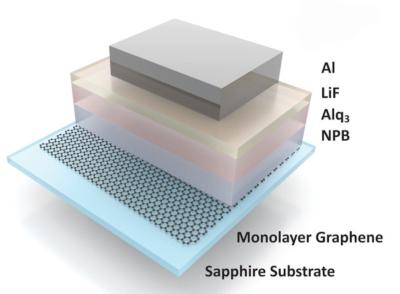 Graphene OLED. Sapphire substrate/monolayer graphene/NPB: 50 nm/Alq3: 50 nm/LiF: 1.5 nm/Al: 100 nm. Image from study in AOM
Graphene OLED. Sapphire substrate/monolayer graphene/NPB: 50 nm/Alq3: 50 nm/LiF: 1.5 nm/Al: 100 nm. Image from study in AOM
Professor Colin Humphreys of Queen Mary and Paragraf, says: “Because of its importance and scarcity there have been many attempts to replace ITO, but no material has been found to have a comparable performance in an electronic or optical device until now. Our paper is the first paper in the world to demonstrate that graphene can replace ITO in an electronic/optical device. We have shown that a graphene-OLED has identical performance to an ITO-OLED. ITO-OLEDs are widely used as the touch screens on our mobile phones.”
Researchers point to moiré nematic phase in twisted double bilayer graphene
Researchers from Columbia University, Harvard University, RWTH Aachen University, University of Innsbruck, Drexel University, National Institute for Materials Science in Japan, University of Minnesota and others have studied twisted double sheets of bilayer graphene and have found an electronic nematic phase.
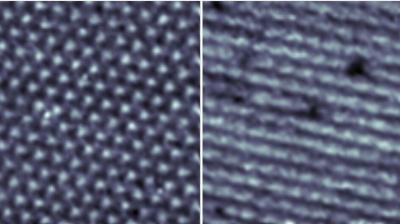
First described in another state of matter called a liquid crystal, a nematic phase occurs when particles in a material break an otherwise symmetrical structure and come to loosely orient with one another along the same axis. This phenomenon is the basis of the LCD display commonly used in televisions and computer monitors. In an electronic nematic phase, the particles in question are electrons, whose behavior and arrangement in a material can influence how well that material will conduct an electrical current in different directions.
Lyten commissioned by U.S DIU to demonstrate battery technology for space applications
Lyten, an advanced materials company developing lithium-sulfur battery technology based on Lyten 3D Graphene, has announced that it secured a prototype Other Transaction (OT) agreement in support of the Defense Innovation Unit (DIU) around high-specific energy storage and management solutions.
A core objective of the agreement is to demonstrate a lithium-sulfur (Li-S) battery solution that will significantly increase the duty cycle of small satellites for the U.S. Space Force, which is one of many applications for the new Li-S battery technology. The ultimate goal of the effort is to develop a lithium-sulfur rechargeable battery capable of three times the energy storage capacity of current lithium-ion (Li-ion) batteries, enabling the use of higher duty cycle spacecraft and those that function longer during an eclipse.
Nanotech Energy named CES 2022 Innovation Award Winner in Sustainability, Eco-Design & Smart Energy Category
Nanotech Energy, producer of graphene-based energy storage, has announced that its non-flammable Graphene-Organolyte batteries have been named a CES 2022 Innovation Award Winner in the Sustainability, Eco-Design & Smart Energy category. The CES Innovation Awards program is an annual competition honoring outstanding design and engineering in 27 consumer technology product categories.
Nanotech Energy produces non-flammable, graphene-based batteries that realize graphene’s potential to create real-world benefits, from safer, more cost-efficient, environmentally-friendly personal electronic devices to creating a more efficient way to harness renewable energy. Nanotech Energy’s proprietary electrolyte, Graphene-Organolyte, is not only stable and non-flammable — it’s also made from inexpensive materials and is easy to manufacture.
Grapheal wins CES 2022 Innovation Award
Grapheal has received an award for its graphene-enabled products at CES 2022.
Graphene Flagship Associated Member Grapheal has won the “Best in Innovation” Award from the Consumer Electronics Show (CES), considered the world’s most influential technology event. “We’re thrilled to receive this honor,” says Vincent Bochiat, CEO and co-founder of Grapheal. The company develops graphene-enabled technologies for the healthcare and medtech sectors.
The Graphene Handbook, 2022 edition
We're happy to announce the seventh edition of Graphene-Info's very own Graphene Handbook, the most comprehensive resource on graphene technology, industry and market - now updated for 2022. Get your copy now to stay current on graphene research, development and market!
Reading this book, you'll learn all about:
- The properties of graphene
- Different production methods
- Possible graphene applications
- The latest graphene research
- The current market for graphene materials and products
- The main graphene challenges
- Other promising 2D materials
Haydale's GNPs to improve textiles used by iCraft and Pro-Spec
Haydale has announced that, following the successful incorporation of graphene nano-platelets (GNPs) in its cosmetic face mask sheets and PPE face masks, iCraft is using Haydale’s functionalized GNPs in its graphene-coated fabric, THERMiT™.
In order to grant increased performance in terms of thermal and antibacterial properties, Haydale’s plasma functionalized GNPs have been used to coat the nylon fibers in the lining of a down jacket. The graphene coated fabric, THERMiT™, was supplied to South Korean sports apparel brand, Pro-Specs, for use in a new graphene-enhanced jacket. The initial production run of 8,000 items, which was available in store and online, sold out within weeks of being released.
Graphene Square shows transparent graphene toaster at CES
At the recent CES event, South Korea-based Graphene Square presented its 'kitchen styler' - a transparent toaster that uses graphene.
In addition to tracking the level of toasting of the bread, the device is also said to offer 50% less power consumption and enable outdoor cooking with rechargeable batteries. The device is also foldable and expandable to dual cooking/warming plates and connects to mobile devices for recipe download/control.
Applied Graphene Materials launches new graphene-enhanced range of coatings, paints and additives
Applied Graphene Materials (AGM) has announced the introduction of two new products based on its GNPs.
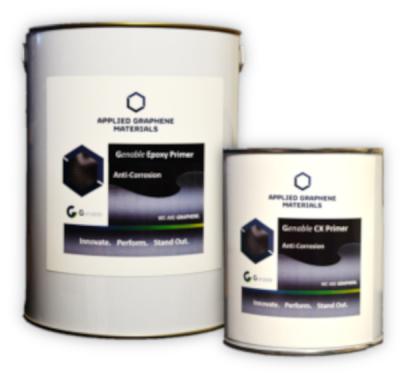
The Company has launched a range of industrial anti-corrosion paint incorporating its Genable graphene additives. The two epoxy-based prototype primer systems are said the AGM to represent an easy way for those considering the adoption of graphene to quickly test and evaluate its potential benefits.



